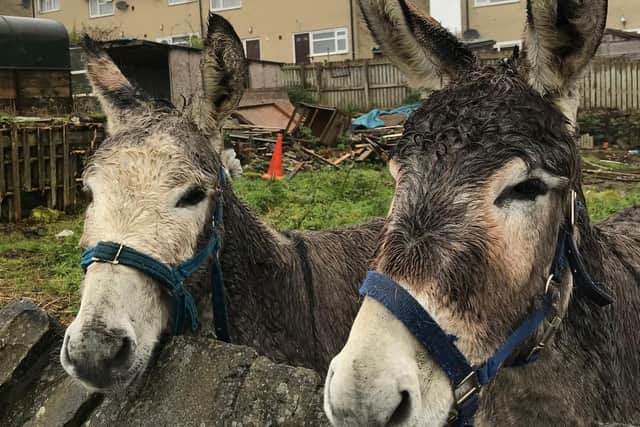Halifax man given banning order after donkeys found living in yard covered in broken glass and metal
and live on Freeview channel 276
Benjamin Peter Marshall of New Street, Southowram, Halifax was sentenced at Bradford Magistrates Court.
Marshall, who had previously failed to comply with advice from both the RSPCA and The Donkey Sanctuary, pleaded guilty to three animal welfare offences, on the morning his trial was due to take place.
Advertisement
Hide AdAdvertisement
Hide AdThese offences included the unnecessary suffering to 13-year-old Jemimah, by failing to meet her basic welfare needs and not seeking veterinary treatment for laminitis and adequate dental care.


The third offence related to a second donkey, four-year-old, Snowball, daughter of Jemimah.
Again, her basic welfare needs were not being met; including the failure to provide continuous access to a clean supply of fresh water and a suitable and safe environment to live in. Marshall also failed to provide Snowball with adequate foot care.
The RSPCA launched a joint investigation with The Donkey Sanctuary, after they found the basic welfare needs of the animals were not being met and the donkeys needed urgent veterinary and farriery treatment.
Advertisement
Hide AdAdvertisement
Hide AdRSPCA Inspector Rebecca Goulding and two welfare advisers from The Donkey Sanctuary discovered the donkeys living on a waste site that contained many dangerous objects.
The area was littered with broken plastic, wood, scrap metal, dumped wooden pallets and rolls of metal fencing among other rubbish.
There was also a broken trailer that had multiple sharp edges on it and the area was strewn with broken metal and glass. She found that there was no area of the field that was safe or suitable for the donkeys.
The grass cover was sparse and the forage foraging provided for the two donkeys was wet and covered in mud and faeces.
Advertisement
Hide AdAdvertisement
Hide AdThe owner advised the donkeys had access to water in a dustbin, but the water level was too low down for the donkeys to reach. Their shelter was dirty and deep in mud and faeces and meant the donkeys had no hardstanding.
Inspector Goulding said: “Donkeys require shelter at all times as, unlike horses, their coats are not well adapted to our climate and so they require shelter from the weather, but especially the rain, wind and cold.”
Vet Dr Suzanne Green from Greenway Equine Veterinary Services, was called to assess the donkeys’ conditions and found that Jemimah was extremely lame with laminitis. She had an overgrown foot and was in a lot of pain. Marshall told the vet; “...the donkey had been like that for 10 years and that it was fine”.
Snowball’s feet were overgrown and starting to curl upwards. She had thrush and severe white line disease in all four of her feet.
Advertisement
Hide AdAdvertisement
Hide AdBoth donkeys were also found to have extremely sharp teeth and there was no evidence of previous dental work having been done.
The vet recommended the donkeys were removed from the site and West Yorkshire Police took them into possession, passing them into the RSPCA’s care. The donkeys were transported to a Donkey Sanctuary funded holding base so they could receive specialist care and start their rehabilitation.
In mitigation, the court heard that Marshall should be given credit for his guilty plea and he had now agreed to sign Snowball over to the RSPCA. Jeminah had been signed over at an earlier date.
The Magistrates stated this was a serious case and that Jemimah had suffered significantly. The two donkeys had not been provided with water, adequate vet treatment or farrier care and, in short, the donkeys’ needs were not met.
Advertisement
Hide AdAdvertisement
Hide AdIn addition to the five-year disqualification from keeping donkeys, magistrates sentenced Marshall to an 18-month community order with 150 hours of unpaid work in the community and ordered him to pay £350 costs and a victim surcharge of £90.
Following the sentencing hearing Hannah Bryer, Head of Welfare at The Donkey Sanctuary, said: “We know that taking care of donkeys is a hugely rewarding experience, and it really is a privilege to own such endearing animals, but it comes with great responsibility. Donkeys require caring and compassionate management to ensure they lead healthy and enriched lives.
“Sadly situations like this are not uncommon. Lack of appropriate hoof care is still one of the most common welfare issues faced by donkeys in the UK today. Our welfare team works throughout Great Britain to offer advice and information about the easy steps that can be taken to avoid this type of suffering.”
More than a year has passed since Snowball and Jemima were rescued and although The Donkey Sanctuary has done all it can to keep Jemimah comfortable during her rehabilitation, her irreversible chronic hoof condition can only be managed.
Advertisement
Hide AdAdvertisement
Hide AdKeira Benham, Donkey Welfare Adviser from The Donkey Sanctuary, said: “Jemimah’s quality of life is being closely monitored and should her condition deteriorate, we will have to seriously consider the option of euthanasia as the last kind decision we make for her. Photo credit: The Donkey Sanctuary
“We have prepared for this possibility by introducing Snowball and Jemimah to another donkey called Dolly, who is of a similar age, which mitigates the risk of Snowball suffering from stress if she were to lose her companion mum.”